Movie Review – 6 Days
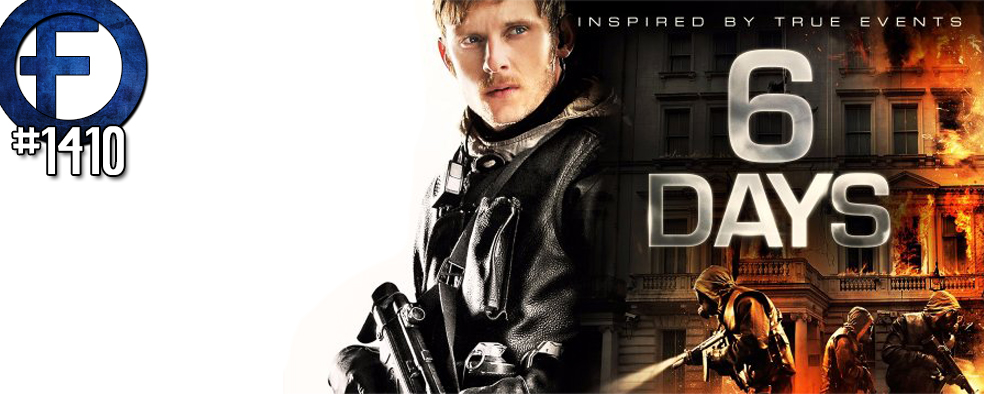
Director : Toa Fraser
Year Of Release : 2017
Principal Cast : Jamie Bell, Abbie Cornish, Mark Strong, Martin Shaw, Emun Elliot, Ben Turner, Aymen Hamdouchi, Tim Piggott-Smith, Tim Downie, Andrew Grainger, Martin Hancock.
Approx Running Time : 94 Minutes
Synopsis: In April 1980, armed gunmen stormed the Iranian Embassy in Princes Gate, London and took all inside hostage. Over the next six days a tense standoff took place, all the while a group of highly trained soldiers from the SAS prepared for a raid the likes of which the world has never seen.
**********
Margaret Thatcher’s England, 1980. Terrorism in London is nothing new – the “troubles” have been raging for years – until a group of gunmen storm the Iranian embassy and threaten to kill hostages until their demands are met. 6 Days recreates the situation in exacting detail, told from multiple angles – the news-crews waiting at the end of Princes Gate, Kensington, the SAS soldiers primed to enter the building should a hostage be killed, the police and bureaucrats trying to negotiate peace in the buildings next door, and the Whitehall political elite reminding us all of the “no negotiation” tactic Thatcher instituted at the beginning of her rule. The game of ducks-and-drakes at play is inherently tense, and viewers unfamiliar with the real events of those 6 long days will find themselves embroiled in a wifi-free, low-fi technology waiting game of competing motivations.
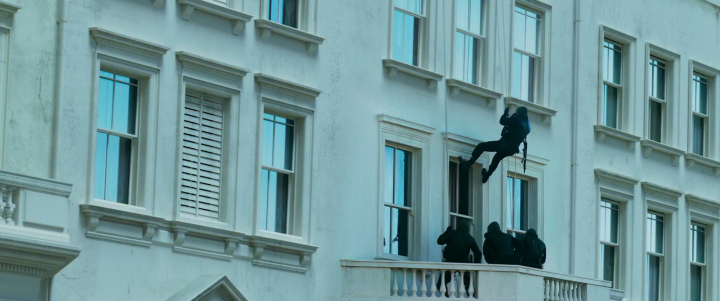
British Detective Superintendent Max Vernon (Mark Strong) is forced to negotiate when six armed terrorists break into the Iranian Embassy in London. The group, led by a man named Salim (Ben Turner) are seeking the release of prisoners in their home country, and safe passage out of England. Government officials, led by William Whitelaw (Tim Pigott-Smith) intend to adhere to Magaret Thatcher’s strict no-negotiation policy, and purport to insert a paramilitary SAS group, commanded by Roy (Emun Elliot) and Rusty Firmin (Jamie Bell), to resolve the situation by force as required. On the ground, outside the embassy, a gaggle of reporters and television crews assemble to witness the unfolding drama, among them Katie Adie (Abbie Cornish), who describes the events to a live audience as they unfold. Inevitably, as the days wear on and the terrorists become more agitated, the fate of the hostages becomes dire and direct action must be taken; the only question is, who will survive?
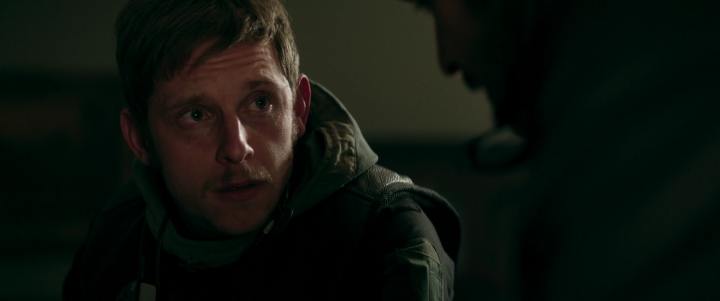
Although the poster and marketing for 6 Days might indicate otherwise, this film isn’t an all-out action blockbuster. The film plays more like a thriller, a slowly ratcheting horror of inexorable fate and foregone conclusions, from the moment the six men enter the Embassy to the final blood-soaked moments, and the “action” as such is depicted in an assured, deliberate manner that allows us not only to focus on the few souls we follow throughout, but to appreciate the stakes and the limitations 1980’s humanity had to work with. Heroism isn’t always marked with spandex and a cape, but rather those standing at the end of a gunfight: the attack on the Iranian Embassy and the resulting strike against the terrorists was seen as a landmark event in UK domestic history, and was broadcast in prime-time to millions of viewers across the country sitting down for their tea.
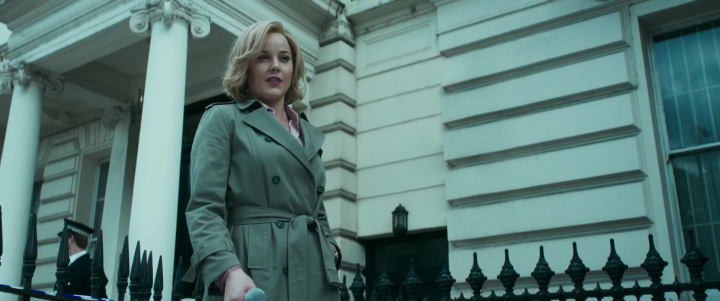
Written by New Zealand director Glenn Standring, 6 Days is an intriguing, if often perfunctory, display of cinematic storytelling in its purest form. The set-up is simple, the preamble short, and the characters drawn from true life (if poetically embellished), and the dialogue is to the point and refined to deliver exactly the right character and plot beats are required to jolt the audience. There’s no frenzy, no rapid-fire posturing for the film’s cameras here, no detritus-infused cacophonous racket to distract the audience. No, this is as purely character driven as it is utter madness, and the cast do solid work delivering fine performances working to their strengths.The production design on the film is also worthy of note, with costuming and presented technology nearly faultless in that available to the people of the day. Younger viewers will delight at an old-time landline phone being used to talk into, while an absence of satellite technology or computer-screen whizz-poppery confines the drama of the movie to the actual characters. I know, revolutionary!
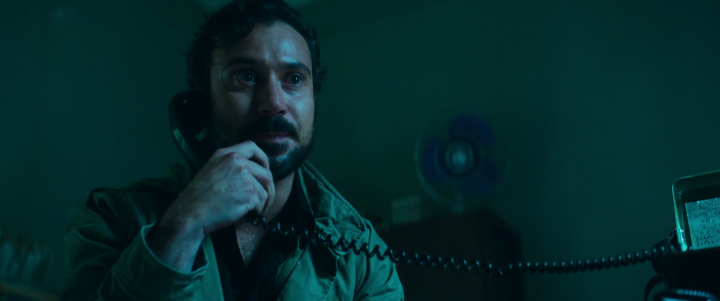
Jamie Bell, as Rusty, has limited depth to his role but offers a ferocity and endeavour to match his highly-trained persona, while Mark Strong’s undemonstrative delivery of conversation across the phone-lines with Salim offer a sense of calm throughout what must surely have been an enormously stressful affair to manage. Ben Turner’s Salim is the pacifist one of the terrorist group, the “weak link” in the chain so to speak, and it’s through him we get a sense of the plotters’ fragility (in spite of including known soldier Shakir Abdullah Radhil – aka “Faisal” – who is depicted as the most militant of the group) before the assault begins. Of the lead cast, it’s Abbie Cornish’s Katie Adie who is most problematic. I’m not sure if it’s her delivery, her accent, or her dialogue itself, but Cornish comes across as terribly wooden and altogether clumsy, although a quick internet search for the real Adie seems to indicate a fairly approximate ghosting of her tics and nuances. Either way, it was enough to draw me out of the film somewhat, the only blemish in what is generally a taut,well directed affair that delivers.
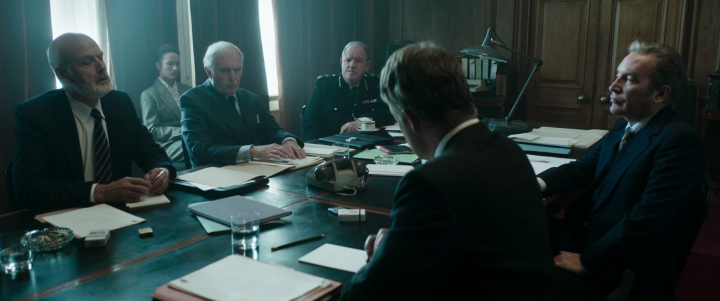
The director, Toa Fraser, gives the film a precision and graceful strength that never feels gratuitous or flamboyant. Muted tones and a dithering, tremulous score (by composer Lachlan Anderson) slowly, slowly, deliberately marinate the inherent thrill of the plot and the characters’ interactions within it until the explosive finale, which while occasionally confusing, is still captivating. Hitchcock once said “there is no terror in the bang, only the anticipation of it”, and Fraser seems to relish this ideal. He drags as much drama and tension from not only each plot strand but also within each scene as well. Numerous times the SAS team are ready to go, locked and loaded, and are stood down as another respite is achieved. This ebb-and-flow keeps the audience on edge, particularly those who aren’t familiar with the event, and coupled with Anderson’s driving, sonorous score this makes the audience’s skin prickle with anticipation – exactly as Hitchcock would have liked.
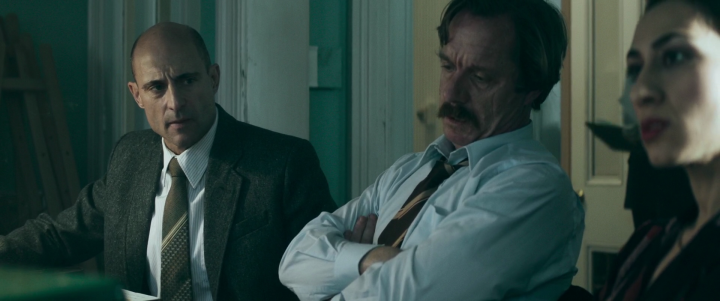
6 Days tells its story with as little fanfare or ostentation as possible, and the viewer will be rewarded with a commendably solid film that might just leave you with shorter fingernails than when you began. The cast are all solid, the direction is perfunctory but engaging, although the low-budget feel is never truly thrown off, and the premise itself is rooted in truth that more often is stranger than fiction. If you’re a fan of Munich and Who Dares Wins (the latter taking its inspiration from these events, while the former is name-checked in part early in this film) then 6 Days will deliver some reserved yet compelling action.





